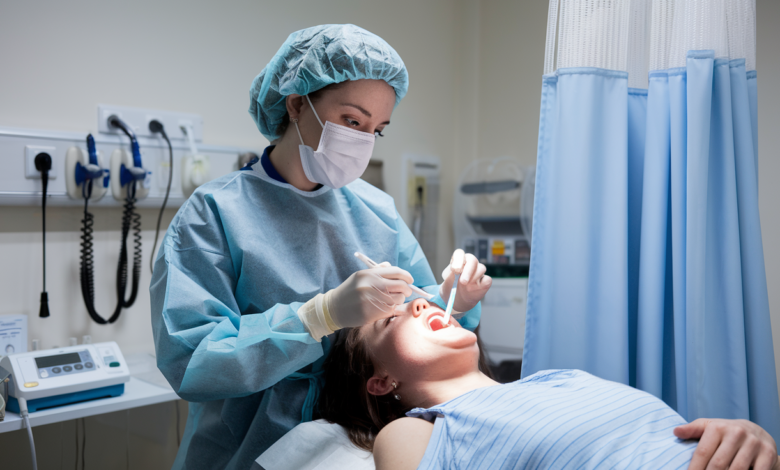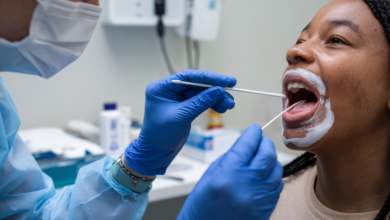Comprehensive Guide to Oral Thrush Treatment: Solutions and Prevention

Oral thrush, also known as oral candidiasis, is a common fungal infection that affects the mucous membranes of the mouth. It occurs when the natural balance of yeast in the mouth is disrupted, allowing Candida albicans to grow uncontrollably. While oral thrush can affect anyone, it is more common in individuals with weakened immune systems, babies, older adults, and those who use dentures or inhaled corticosteroids.
Recognizing the symptoms of oral thrush and understanding the various treatment options are essential for both managing the condition and preventing its recurrence. In this guide, we explore the causes, treatments, and preventive measures to combat oral thrush effectively.
Understanding the Causes of Oral Thrush
Oral thrush is primarily caused by an overgrowth of the Candida fungus, which is naturally present in the mouth in small amounts. Certain factors can create an environment that promotes its growth, including:
- Weakened immune system: Individuals with conditions like HIV/AIDS, cancer, or diabetes, or those undergoing chemotherapy, are more susceptible to oral thrush.
- Antibiotic use: Prolonged use of antibiotics can disrupt the natural balance of microorganisms in the mouth, leading to the overgrowth of Candida.
- Steroid medications: Using inhaled corticosteroids for asthma or other respiratory conditions can increase the risk of developing oral thrush.
- Poor oral hygiene: Not maintaining proper oral hygiene, especially with dentures, can contribute to the development of oral thrush.
- Dry mouth (xerostomia): A lack of saliva can lead to the growth of Candida, as saliva plays a key role in controlling the environment of the mouth.
Symptoms of Oral Thrush
The symptoms of oral thrush can vary in intensity, but common signs include:
- White lesions on the tongue, inner cheeks, roof of the mouth, and sometimes the gums or tonsils.
- Soreness and redness inside the mouth, particularly in the affected areas.
- Difficulty swallowing or feeling as though food is stuck in your throat.
- Cracking and redness at the corners of the mouth (angular cheilitis).
- Loss of taste or an unpleasant taste in the mouth.
These symptoms can become severe if left untreated, particularly in individuals with compromised immune systems.
Top Treatments for Oral Thrush
1. Antifungal Medications
The most effective treatment for oral thrush involves the use of antifungal medications. These medications come in different forms, such as:
- Oral antifungal tablets (fluconazole or itraconazole): These are typically prescribed for individuals with more severe or persistent cases of oral thrush.
- Topical antifungals: These include nystatin suspension (liquid), clotrimazole lozenges, or miconazole gel. These are commonly prescribed for mild cases of oral thrush and need to be applied or held in the mouth for a specific duration.
- Intravenous antifungal treatment: In severe cases, especially in immunocompromised individuals, intravenous antifungal treatment may be necessary.
2. Proper Oral Hygiene Practices
Maintaining good oral hygiene is crucial in both treating and preventing oral thrush. Key practices include:
- Brushing and flossing regularly to remove food particles and plaque that can contribute to yeast growth.
- Sterilizing dentures properly by soaking them overnight in a denture-cleaning solution.
- Rinsing the mouth after using inhaled corticosteroids to reduce the risk of developing oral thrush.
- Replacing your toothbrush after recovering from an oral thrush infection to prevent reinfection.
3. Home Remedies
Several natural remedies can support the treatment of oral thrush by creating an environment that discourages yeast growth. However, it is important to note that these remedies should complement medical treatments, not replace them.
- Saltwater rinse: Salt has natural antiseptic properties. Gargling with a solution of salt and warm water can help reduce the symptoms of oral thrush by soothing irritation and removing yeast.
- Baking soda rinse: Baking soda helps restore the pH balance of the mouth, making it less hospitable for Candida to thrive.
- Yogurt and probiotics: Consuming plain yogurt with live probiotics or taking probiotic supplements can promote the growth of beneficial bacteria in the mouth and gut, which helps fight off Candida overgrowth.
- Coconut oil pulling: Coconut oil contains antifungal properties. Swishing it in your mouth for 10-15 minutes daily can help reduce the presence of Candida.
4. Dietary Adjustments
Making certain dietary changes can help manage oral thrush by reducing the foods that contribute to yeast growth. These changes include:
- Limiting sugar intake, as sugar fuels the growth of Candida.
- Avoiding processed foods and refined carbohydrates.
- Eating more fiber and nutrient-rich vegetables to promote overall oral health.
- Drinking plenty of water to stay hydrated and encourage saliva production.
Prevention of Oral Thrush
Preventing oral thrush requires a proactive approach, particularly if you fall into one of the high-risk groups. The following preventive measures can significantly reduce the risk of developing oral thrush:
1. Maintain Proper Oral Hygiene
As highlighted earlier, good oral hygiene is key to preventing oral thrush. Brushing twice a day, flossing, and using antiseptic mouthwash regularly can help maintain a healthy balance of bacteria in the mouth.
2. Monitor the Use of Medications
If you use inhaled corticosteroids or other medications that increase your risk of oral thrush, it is essential to:
- Rinse your mouth thoroughly after each use to clear any residue.
- Discuss with your healthcare provider about using a spacer device for inhalers, which reduces the amount of medication that stays in the mouth.
3. Strengthen the Immune System
A weakened immune system is one of the primary risk factors for oral thrush. To reduce the risk:
- Eat a balanced diet rich in vitamins and minerals.
- Ensure you are getting enough rest and managing stress effectively.
- Consult your healthcare provider if you are undergoing treatment that compromises your immune system (such as chemotherapy) to discuss preventive antifungal treatments.
4. Regular Dental Checkups
Visiting your dentist regularly can help in early detection and management of oral thrush. Dentists can monitor oral hygiene practices and suggest appropriate adjustments to prevent the overgrowth of Candida.
When to See a Doctor
Although mild cases of oral thrush can be treated at home, it is important to seek medical advice if:
- The infection does not improve after a week of treatment.
- You experience frequent episodes of oral thrush.
- The symptoms are severe or accompanied by fever and difficulty swallowing.
- You have a compromised immune system and suspect oral thrush.
Your healthcare provider may need to conduct additional tests or prescribe stronger antifungal medications to resolve the infection effectively.
Conclusion
Oral thrush is a manageable condition that can be treated with antifungal medications, proper oral hygiene, and lifestyle changes. By understanding the causes, symptoms, and treatment options available, individuals can take proactive steps to manage and prevent the recurrence of oral thrush. Incorporating natural remedies and dietary adjustments can complement medical treatments, ensuring a holistic approach to maintaining a healthy mouth environment.


